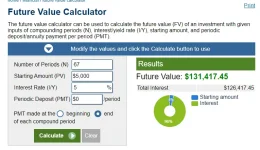I have always advocated (as far as I can remember) a similar idea as a
supplement to social security. Congress being what it is, however,
Helix's concern about "privatization" is always relevant (see what ideologues did to the postal service). If they can be cheap, they will be. There not being an existing program, I have done something similar for my own children.
There are some problems with administering such a program, as individuals always want to control investment strategies and program managers need protection from lawsuits. But virtually every State of the union, and the federal government, and numerous business and union entities, administer investment programs for their employees already (I'm not aware of any that don't), so that part is a virtual no-brainer.
That's what 401(k)s are, as well as other "defined contribution" plans.
My State's program has always been top-notch. Most provide returns that exceed the general markets. It's almost always better to rely on professional money managers. That's essentially what "mutual funds" are.
There are risks, of course, and the biggest one is politicians. Any time there is a pool of money available, they'll want to tap into it. It needs to be well insulated from raiding. Second, is that institutional investors (which is what this is) can have great impact on markets. The reality is that hundreds of millions of us already do so without knowing it.



